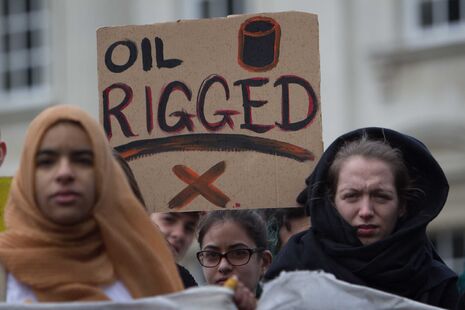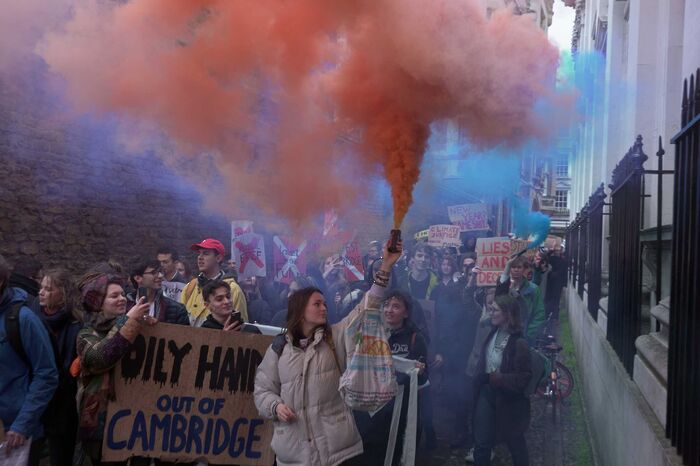Exclusive: Redfern email contradicts University statement on fossil fuel company’s funding offer
The email, leaked to Varsity, showed that Redfern believed BHP’s decision to rescind was for reasons “associated with the divestment debate”

Two weeks ago, the University said in a statement to The Guardian that a £20m donation offer from mining and petroleum company BHP Billiton to Cambridge’s Earth Sciences department was rescinded because “the project application to [the] government was unsuccessful”.
However, an email leaked to Varsity that was sent by Professor Simon Redfern, the main contact on the BHP Billiton donation, contradicted the University’s statement.
In November, Redfern sent an email to all members of the Earth Sciences department saying that he believed the mining and gas company’s decision to rescind their funding offer was for reasons “associated with the divestment debate within the University”.
Redfern told Varsity today that in his email, “I was simply putting myself in their shoes – it was simply my supposition, but I have no evidence to support it. On the other hand, in the face of the urgent need to transition our world to a sustainable future, [the] supposition that [it was associated with the divestment debate] still makes sense to me.”
A spokesperson for BHP Billiton told Varsity: “BHP can confirm that it withdrew a proposed donation in November 2018, but that decision was not a result of the divestment debate within the University.”
The University’s statement was in response to a bombshell Guardian report which revealed that two members of the University’s divestment working group, including Redfern, did not disclose that they were directly involved in two major proposed donations to Cambridge, one of which was from mining and petroleum company BHP Billiton, and the other from oil and gas company BP.
Cambridge has said repeatedly that research funding from fossil fuels companies has no influence on the question of whether they should divest their endowment from the sector. In the statement to The Guardian, they said: “The suggestion [that funding offers] influenced the divestment working group is untrue.”
It claimed: “The £20m donation offer from BHP was part of a project proposal from the University of Cambridge and other potential partners to the government’s UK Research Partnership Investment Fund to provide laboratory, interaction, new teaching and learning spaces for Earth Sciences to help it tackle climate change.
“There was no other BHP money proposed. The project application to government was unsuccessful and BHP withdrew their funding offer.”
In November last year, Redfern’s email to all members of the Earth Sciences department said: “It is with a sense of immense disappointment and deep frustration that I pass on the news that I received a letter from our major donor yesterday informing me that they were withdrawing their offer of support for the new building project.
“The reasons behind their decision lie, I think, in the delay that had been imposed over the last year on moving forward on the project associated with the divestment debate within the University, compounded by the inability of the University to commit support at this stage to the entire project”.
Writing in Varsity today, chair of the divestment working group Professor Dame Athene Donald said Redfern’s involvement in the BHP Billiton donations was brought up at one working group meeting. She claimed it was regarded as a “‘potential’ conflict of interest at some future date, and hence it did not fit on the register of ‘actual’ interests, nor was it regarded as sufficiently concrete to need minuting.”
Documents seen by Varsity also reveal that Vice-chancellor Stephen Toope met with the two representatives from fossil fuel company BP regarding their £2m donation on July 3rd.
The BP donation was “part of a longstanding agreement with a partner who has funded its well-known BP Institute for 25 years”, according to a statement Cambridge gave to The Guardian.
In a statement to Varsity, a spokesperson for the University said: “The Vice-Chancellor had one meeting with BP in 2018. That meeting was in July. BP has supported the University’s BP Institute for decades. Meeting external partners is a routine part of the Vice-Chancellor’s role.”
A spokesperson for pro-divestment campaigning group Cambridge Zero Carbon commented: “the University’s response to being exposed was to deflect their own responsibility with misleading assertions.”
 News / Colleges charge different rents for the same Castle Street accommodation2 March 2026
News / Colleges charge different rents for the same Castle Street accommodation2 March 2026 News / King’s hosts open iftar for Ramadan3 March 2026
News / King’s hosts open iftar for Ramadan3 March 2026 Theatre / Lunatics and leisure centres 4 March 2026
Theatre / Lunatics and leisure centres 4 March 2026 News / Angela Merkel among Cambridge honorary degree nominees27 February 2026
News / Angela Merkel among Cambridge honorary degree nominees27 February 2026 News / News in Brief: waterworks, wine woes, and workplace wins 1 March 2026
News / News in Brief: waterworks, wine woes, and workplace wins 1 March 2026









